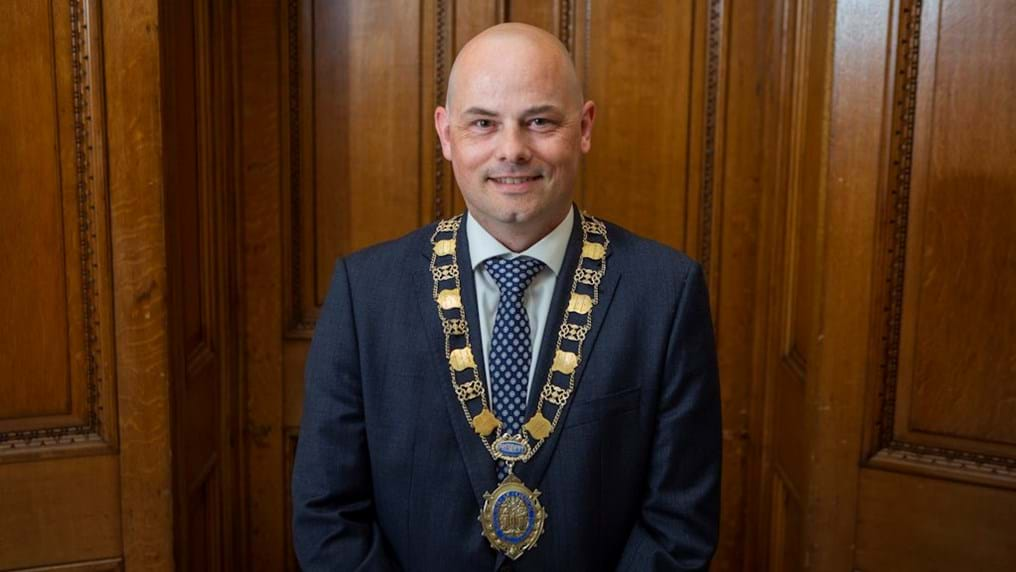New IChemE President wants chemical engineers to ‘be the change’

13th June 2024
The incoming President of the Institution of Chemical Engineers (IChemE) made a powerful call in his Presidential Address, reminding chemical engineers that the stakes of climate change are high and urging them to ‘be the change’.
Mark Apsey delivered his Presidential Address today (13 June 2024) from the Royal Society of Chemistry in London, UK, with members, trustees and invited guests present, and many watching live online.
Stressing that chemical engineers can use their unique abilities to make a profound impact on addressing climate change, Mark referenced IChemE’s 2022 climate change position statement to underscore his conviction that chemical engineers should always put obligations to the natural environment at the front of their minds. Voicing his belief that chemical engineers “should be proud of the things we have contributed to society”, Mark asked the profession to consider how they can continue to make a difference for the better, and lead the way to a sustainable world by striving to re-design and re-engineer processes, just as they have led the way on process safety.
A keen historian, Mark themed his address on ‘History, science, and engineering a sustainable future’. He explored the dimension of time, taking his audience back to 1771, when the birth of large-scale production laid the foundations for the discipline of chemical engineering. He referenced Svante Arrhenius’ work on atmospheric CO2 and global temperature in the late 1800s, reflecting on his own first career project building a carbon dioxide recovery plant.
Entering his presidential year, Mark noted the achievements of chemical engineering in enabling massive innovations in the way we live, while challenging the profession to consider how – in the light of global challenges – it needs to move forward. He set out his intention to use IChemE’s convening power to encourage cross-disciplinary collaboration and achieve more meaningful co-operation with governments, industry partners, employers, academia and the public. By doing this, he said, chemical engineers everywhere can further understanding and appreciation of the profession and achieve the Institution’s vision.
Mark reiterated his commitment to helping the profession to find its voice by uncovering and amplifying stories of chemical engineers delivering exceptional work, calling for members to participate in IChemE’s new ‘How I Did It’ campaign by sharing their stories and experiences. He outlined how this and other initiatives, including the Chemical Engineering Challenge Report, will help put chemical engineering firmly on the map. Mark drew particular attention to IChemE’s Sustainability Hub, a knowledge and training resource to support the development of sustainability and systems thinking skills for chemical engineers.
In a Q&A session following his address, Mark spoke of his hopes of inspiring the next generation of diverse talent to meet the challenges humanity faces, including encouraging more schools and teachers globally to access support via IChemE’s UN SDG-aligned DiscoverChemEng campaign. Reflecting on the need to encourage yet more young people to study chemical engineering, Mark spoke of his delight that the University of Exeter – his alma mater - is preparing to relaunch chemical engineering as a degree course, supported by IChemE.
The 2024 Presidential Address was live-streamed via IChemE’s YouTube channel and a recording is available to view.
Links
IChemE’s climate change position statement
Share stories to the ‘How I did it’ campaign
Chemical Engineering Challenge Report
Notes to editors
Mark Apsey - Biography
Mark started his career at multinational engineering company WS Atkins, before joining GlaxoSmithKline in 2001 and returning to Atkins in 2007 as a Senior Engineer working on upstream oil and gas and offshore wind projects. In 2009, Mark joined Energyexcel, a start-up focused on energy efficiency and renewable energy solutions, becoming Technical Director, before its sale to leading renewable energy company Ameresco in 2014. In 2020 Mark was made Ameresco’s UK Managing Director, and in January 2024 was appointed Senior Vice President.
Mark is a board member and Managing Director for the world-first Bristol City Leap initiative, a public-private partnership game-changing approach towards decarbonisation at city-scale that serves as a blueprint for cities around the world to follow, enabling the delivery of over £1 billion of investment into Bristol’s energy system.
Mark became a Chartered Chemical Engineer in 2004 and was elected as Fellow of IChemE in 2018. He was awarded an MBE for his services to sustainable energy and energy efficiency in the Queen’s 2020 New Year Honours.
Mark began volunteering for IChemE as an undergraduate. He led the working group that published the IChemE Energy and Resource Efficiency Guide, becoming the IChemE Energy Centre chair in 2019, and is active on IChemE’s behalf across the energy and sustainability arena, including engagement with central government and speaking at the UN’s Framework Convention on Climate Change (UNFCCC), COP22 and COP23 meetings, and at many global conferences.
Contact
For more information please contact:
Ann Baylis, Communications Executive and PR Lead, IChemE
t: +44 (0) 1788 534477
e: abaylis@icheme.org
Dan Owens, Communications Executive, IChemE
t: +44 (0) 1788 534458
e: dowens@icheme.org
What is chemical engineering?
Chemical, biochemical and process engineering is the application of science, mathematics and economics in the process of turning raw materials into everyday, and more specialist, products. Professional chemical engineers design, construct and manage process operations all over the world. Energy, pharmaceuticals, food and drink, synthetic fibres and clean drinking water are just some of the industry sectors and products where chemical engineering plays a central role.
IChemE
The Institution of Chemical Engineers (IChemE) advances chemical engineering's contribution for the benefit of society. We facilitate the development of chemical engineering professionals and provide connections to a powerful network of around 30,000 members in more than 100 countries.
We support our members in applying their expertise and experience to make an influential contribution to solving major global challenges, and are the only organisation permitted to award Chartered Chemical Engineer status and Professional Process Safety Engineer registration.
More information at www.icheme.org.